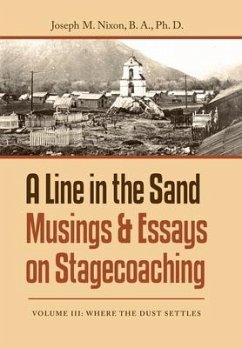
A Line in the Sand
Musings & Essays on Stagecoaching
Versandkostenfrei!
Versandfertig in über 4 Wochen
32,99 €
inkl. MwSt.

PAYBACK Punkte
16 °P sammeln!
As a part of three series of essays, A Line in the Sand: Volume II, Dusty Trails to Shiny Rails examines the rise and decline of stagecoaching as an industry in the Frontier West. The first volume, Ancient Footsteps, considers very early (6,600 years ago) development of a series of footpaths describing transportation networks in place long before the arrival of Euro American settlers, leading to the precursors of stagecoach trails appropriated and adapted by Spanish, Mexican, and later American (US) governments. The third volume, Where the Dust Settles, focuses on the use of adobe as an archit...
As a part of three series of essays, A Line in the Sand: Volume II, Dusty Trails to Shiny Rails examines the rise and decline of stagecoaching as an industry in the Frontier West. The first volume, Ancient Footsteps, considers very early (6,600 years ago) development of a series of footpaths describing transportation networks in place long before the arrival of Euro American settlers, leading to the precursors of stagecoach trails appropriated and adapted by Spanish, Mexican, and later American (US) governments. The third volume, Where the Dust Settles, focuses on the use of adobe as an architectural medium along early stagecoach routes. In aggregate, the three volumes consider the rise and efflorescence of transportation systems crossing the desert culminating with the advent of the modern interstate highway system in place today.












